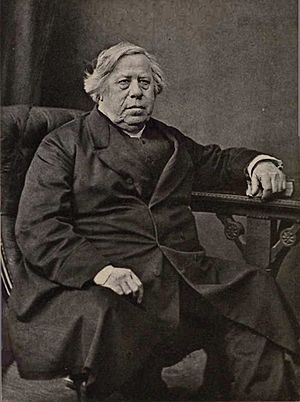Charles Pritchard facts for kids
Quick facts for kids
Charles Pritchard
|
|
|---|---|
 |
|
| Born | 29 February 1808 Alberbury, Shropshire, England
|
| Died | 20 May 1893 (aged 85) |
| Awards | Royal Medal (1892) |
| Scientific career | |
| Fields | astronomy |
| Influences | John Herschel |
Charles Pritchard (born February 29, 1808 – died May 28, 1893) was a British astronomer, a church leader (clergyman), and someone who worked to improve education. He started the Clapham Grammar School in 1834. He made sure that science was an important part of what students learned there.
Contents
Early Life and Education
Charles Pritchard was born in Alberbury, Shropshire, England. He was the fourth son of William Pritchard. He later moved to London. There, he attended the Merchant Taylor's School. He also studied at Poplar Academy.
At Poplar Academy, he was taught by John Stock. Stock was an educator who believed in new ideas. Charles learned a lot about how the physical world works. When he was sixteen, he went to St John's College, Cambridge.
He graduated from Cambridge in 1830. In 1832, he became a fellow at his college. The next year, he became a clergyman. He also became the head of a private school in Stockwell.
Headmaster and Astronomer
From 1834 to 1862, Charles Pritchard was the headmaster of Clapham grammar school. He believed that science was very important. He made sure that science was taught in the school's lessons. In 1846, a chapel was built at the school.
After leaving Clapham, he moved to Freshwater. This is on the Isle of Wight. He became very active in the Royal Astronomical Society. He was the honorary secretary in 1862. Later, he became the president in 1866.
His career as a professional astronomer began in 1870. This was when he became the Savilian professor of astronomy at the University of Oxford. He asked the university to build a special telescope. This telescope would be used for teaching students. It would also be used for new research.
A generous gift from Warren de la Rue helped a lot. De la Rue gave instruments from his own observatory. This led to the creation of a new university observatory. Pritchard started his work there by studying the moon. He looked at how its axis wobbles slightly.
Measuring Star Brightness
In 1882, Pritchard began to study the brightness of stars. This is called photometry. He used a special tool called a "wedge photometer". With this tool, he measured the brightness of 2,784 stars. These stars were located between the North Pole and about -10° declination (a way to measure a star's position).
He published his findings in 1885. The book was called Uranometria Nova Oxoniensis. His important work was recognized in 1886. He received the Gold Medal of the Royal Astronomical Society. He shared this award with Professor Pickering.
Photography and Star Distances
After this, he started using photography to measure star distances. This is known as stellar parallax. He first tested this method on the star 61 Cygni. His results matched earlier measurements very well.
This success encouraged him to measure the distances of other bright stars. He published his results in the Publications of the Oxford University Observatory. Even though there were some small errors, his work was very important. It showed that photography could be used for such detailed astronomical studies.
When a worldwide survey of the sky was planned, Pritchard was given a specific area. He was responsible for the zone between 25° and 31° north declination. He made good progress in mapping the stars in this area before he passed away.
Pritchard became a fellow of New College, Oxford, in 1883. He also became an honorary fellow of St John's College, Cambridge, in 1886. He was elected a fellow of the Royal Society in 1840. In 1892, he received one of the Royal Medals. This was for his work on photometry and stellar parallax.
Family
Charles Pritchard had a son named Sir Charles Bradley Pritchard. His son became an important administrator in British India.
Works
- Occasional thoughts of an astronomer on nature and revelation (1889)
- Modern science and natural religion (1874)
 | Anna J. Cooper |
 | Mary McLeod Bethune |
 | Lillie Mae Bradford |

